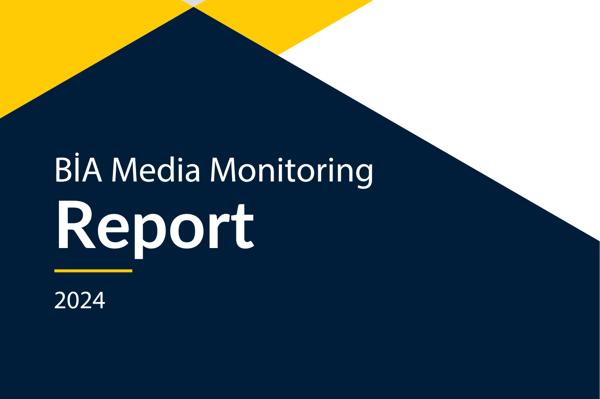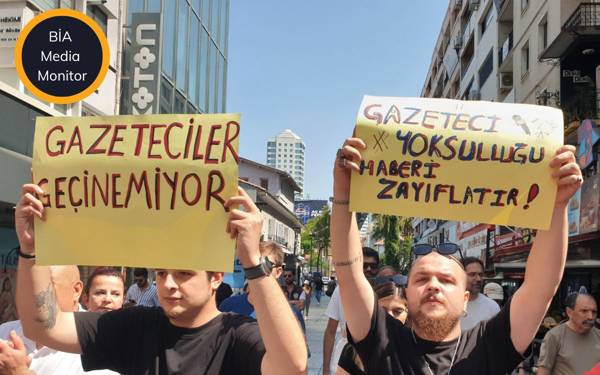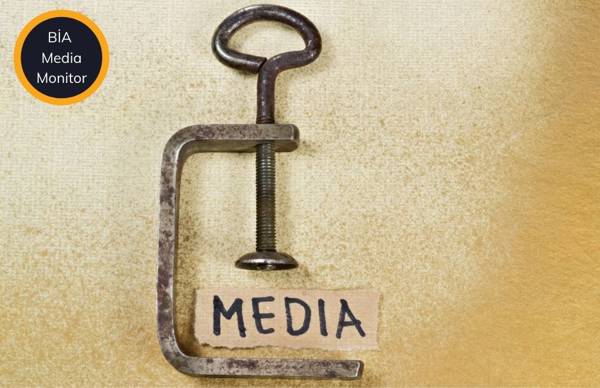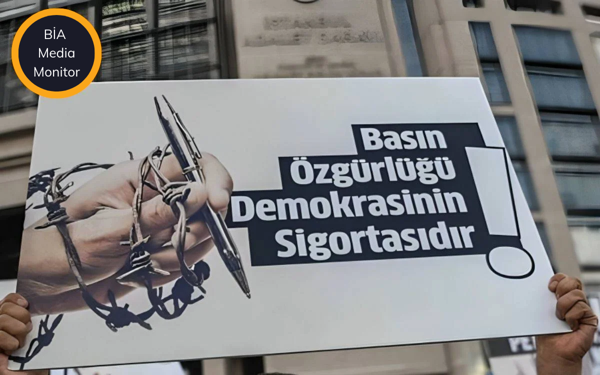BIA2 Annual Media Report: No Jailing But
However, the limitations on judicial reporting, brought about by the Media Law, and the new Turkish Penal Code (TCK), which will go into effect on April 1, cast a shadow on the "rights" under the new Media Law. These rights were viewed as the most important development of the year 2004.
The Media Monitoring Desk of the " "Establishing a Countrywide Network in Turkey for Monitoring and Covering Media Freedom and Independent Journalism" (BIA2) project, which has released three quarterly Media Monitoring Reports in 2004, is worried that the new TCK will lead to an increase in the variety of limitations on press freedom, and cause them to be more widespread. The concern is referred to in BIA2's 2004 annual report.
The heavy fines brought about by both laws could lead to the closing down of especially a considerable number of local media organizations, which strive to survive with very limited resources.
Army not in RTUK anymore, but it still exists in courts
One of the important developments in 2004 was the lifting of the "army's influence" on Radio and Television Higher Board (RTUK).
President Ahmet Necdet Sezer approved the law, which annulled the authority of the General Secretariat of the National Security Council (MGK) to propose members for RTUK. With this amendment, the number of board members fell to eight from nine.
Even though the legal authority of the army has been reduced, a military prosecutor could appeal the case of Abdurrahman Dilipak, accused of "damaging senior-junior relations.''
Despite the EU...
In the same year that Turkey got a date from the European Union to begin membership negotiations, journalists continued to be beaten, detained and sued. Those responsible remained unpunished. RTUK continued to suspend television and radio broadcasts.
The 32-page report provides a detailed account of 115 cases and the conditions of 222 journalists, under the topics: "attacks and threats," "detentions and arrests," "trials and attempts," "European Court of Human Rights," "RTUK practices," "regulations and seeking rights," and "censorship and reactions."
RTUK is expecting applications for Kurdish broadcasts
Local and regional media organizations are still unable to air programs in different languages one year after a regulation was passed to allow national private and state media organizations to air programs in "languages and dialects other than Turkish." "Soz TV" (Word TV) and "Gun TV" (Day TV) in Diyarbakir, and "Cagri FM" (Call FM) from Batman still await permission.
Broadcasts in the Bosnian language, Kirmanchi and Zaza dialects of Kurdish, Arabic and Circassian began on June 7 and still continue on Turkish Radio and Television channels. There has been no response to demands for broadcasts in the Laz dialect.
The media organizations, which delayed transferring money in advertisement shares, were ordered off the air while the Allocation of Frequencies, which was specified as the main post of RTUK when it was established in 1994, is still on the wait.
The Constitutional Court ruled that the article granting "quotas to political parties in parliament in the election of RTUK members," and the article on the "50 percent capital share in television and radio stations with an annual rating of over 20 percent" of law no: 4756 on the establishment and operation of radio and televisions, are against the Constitution. The government is expected to make the necessary changes to the articles.
38 cases were launched against media organizations; fines exceeded 1 trillion liras
According to the BIA2 Report, which talks about 115 cases, media organizations were charged with violating the Turkish Penal Code on 38 occasions, the Media Law on 20 occasions, and the Anti-Terrorism Law on seven occasions.
Of a total of 13 cases based on article 159 of the TCK, three resulted in penalties. Of the eight cases based on article 312/2 of TCK, two resulted in penalties and one resulted in an acquittal.
Courts handed a total fine of 1 trillion Turkish liras (1 million new Turkish liras; USD 714,000) to 11 newspapers. Nine of them were local newspapers. Local television and radio stations were handed a total fine of 31 billion liras (31,000 new liras; USD 22,000).
Journalist Mehmet Ali Birand was sued for interviewing the lawyers of the imprisoned Kurdish rebel leader Abdullah Ocalan for his program called "32. Gun" (32th Day) on the private CNN Turk channel. He was charged with "aiding the Kongra-Gel organization." Journalist Savas Ay of "Sabah" newspaper was sued for "insulting the judiciary.
Detentions, beatings and threats continued; those responsible remain unpunished
Reporter Sebati Karakurt of "Hurriyet" newspaper was detained on October 15 for interviewing the officials of the Kongra-Gel organization on the Kandil Mountains. The prosecutor released him after one day. There were a total of 53 detentions similar to this one in 2004.
The BIA2 report also shows that there is no improvement in cases opened by journalists who were attacked, detained or threatened by police officers, paramilitary police, or security forces.
There was no outcome in the complaint about nine journalists who were beaten up by civilian police in Diyarbakir, while covering the March 28 elections. Some of those journalists had to be hospitalized.
A total of 20 journalists and two media organizations were attacked in 2004. Reporter Hakki Cat of the "Mersin" newspaper, who was covering the "Free Citizens' Movement" demonstration, reporter Gokce Uygun from the "Cumhuriyet newspaper" who was covering the KESK demonstration in Istanbul, and reporter Sultan Ozer from the "Gunluk Evrensel" (Daily Evrensel) newspaper, who was covering the demonstration by the Socialist Platform of the Oppressed, were attacked by the police.
Two media organizations and seven reporters were threatened by either relatives of deputies, police or figures in the private sector. Dim Media Center building of the "Yeni Alanya" newspaper was attacked by unknown assailants.
In 2004, 12 reporters were imprisoned. Eight reporters, three of whom were imprisoned, were released.
Memik Horuz, the manager of the "Isci Koylu" (Laborer Villager) newspaper, and Yasar Camyar, the former editor-in-chief of the "Alinterimiz" (Our Efforts) newspaper are still in prison.
Eight other reporters are imprisoned pending the outcome of their trial. They are charged with either "membership in an illegal organization," or "aiding and abetting an illegal organization."
Never ending "Kurdish" penalties to local media
Excluding the months April-June, RTUK ordered 12 local media organizations off the air for a total of 360 days for "disseminating separatist propaganda" and "inciting hatred and enmity."
It asked for defenses from six media organizations, four of which were local, for "disseminating separatist propaganda," and 14 media organizations, 13 of which were local, for "inciting enmity."
Kurdish programs and songs were still reasons to suspend broadcasts. Gun TV in Diyarbakir was punished for broadcasting live the Kurdish conversations at the "Discussing Local Administrations" symposium, and airing Kurdish songs. "Can TV" (Life TV) was punished for airing Kurdish songs.
Radio and television stations were ordered off the air for 360 days, 44 programs were suspended and 242 warnings were sent out.
Forty-four programs on 37 TV channels or radio stations were suspended for violating the fourth article of Law No: 3984 on Radio and Television Institutions and Broadcasts. A total of 242 warnings were sent out to local and national media organizations, and defenses were asked for on 69 occasions.
A total of 16 programs were suspended on 15 national television channels, on grounds of "having a negative effect on children." Forty-eight media organizations, five of which were local, were warned, and 27 national television stations were asked to make a defense.
Turkey convicted by the ECHR in three cases
The European Court of Human Rigths convicted Turkey for violating the freedom of expression in cases opened by Cemil Elden, Zubeyir Ozkaya, Medeni Ayhan, Zeynel Baran, Mehmet Hatip Dicle, Ozkan Kalin, Esref Odabasi, Recep Marasli, Veysi Varli, Huseyin Bora, Mehmet Tekin, Sadik Yasar, Hanifi Yildirim, Zulkuf Aydin, Ertugrul Kurkcu and Ragip Zarakolu who were all convicted because of either their books or speeches. The case brought against Turkey by Haluk Gerger was settled.
ECHR handed a fine of 15,000 euros to Turkey in the case about the murder of newspaper distributor Irfan Agdas. The court is evaluating the cases of Dogan Dogan, the manager of the "Korfezin Sesi" (The Voice of Gulf) newspaper published in Edremit who was detained, and journalist Sinan Kara, who was arrested. (EO/BA/EA/YE)
BİA MEDIA MONITORING REPORT 2024
The government made journalists' lives a living hell in 2024

BİA MEDIA MONITORING/OCTOBER-NOVEMBER-DECEMBER 2024
Truth concealed through repression from all sides targeting journalists

BİA MEDIA MONITORING REPORT
Just silence the journalist, and I won't touch you!

BİA MEDIA MONITORING APRIL-MAY-JUNE 2024
Journalists are on the target and have no legal security anymore!

BİA MEDIA MONITORING REPORT
The era of 'judicial control' confinement and torture in journalism







